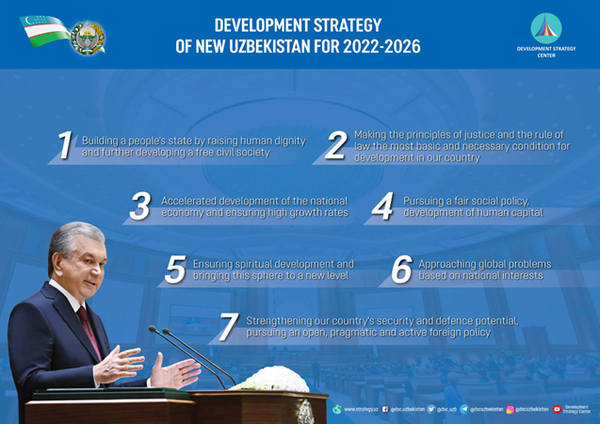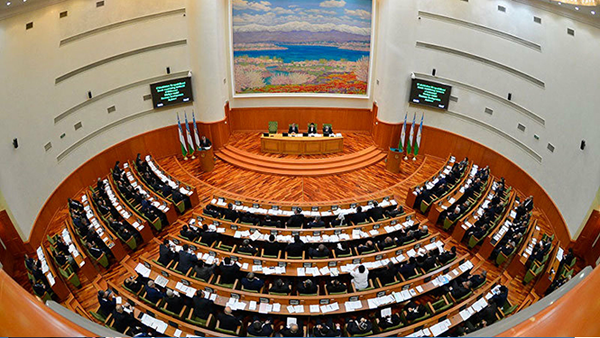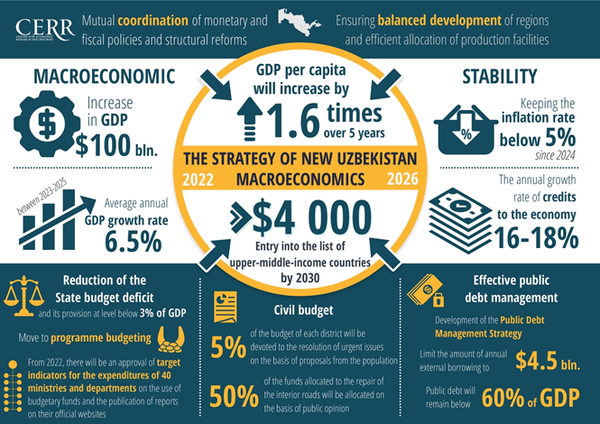A contribution by the Embassy of Uzbekistan in Seoul
The following article by Akmal Saidov has been contributed by the Embassy of the Republic of Uzbekistan in Seoul to The Korea Post media for publication, which publishes 3 English and 2 Korean-language news publications since 1985. The writer, Mr. Akmal Saidov, is the First Deputy Speaker of the Legislative Chamber of the Oliy Majlis of the Republic of Uzbekistan, Director of the National Center for Human Rights.—Ed.
By Akmal Saidov
Last year the Uzbek people has celebrated the 30th anniversary of the Independence. During last 5 years the large-scale creative and improving work is being carried out on the idea “New Uzbekistan”. Human rights protection is considered one of the priorities of our state policy. Today the country has a stable political system that meets the modern criteria of democracy and human rights, and the legislative, executive and judicial authorities at all levels are actively working to strengthen respect for human rights and to promote human rights education throughout the country. But the most important is that the Uzbek society maintains respect for the principles of the Rule of law and human rights.

The strategic goal of building “New Uzbekistan” is laying the foundations for the Third Renaissance. As it is well-known that the territory of modern Uzbekistan in the ancient times was the cradle of two great renaissance epochs - the First (enlightenment - IX-XII centuries) and the Second (Temurid - XIV-XV centuries) Renaissance.
Today Uzbekistan is becoming a country of democratic transformation, big opportunities and practical deeds. This process is the greatest result of our reforms during last years. Uzbekistan has also developed national indicators for the implementation of the UN Sustainable Development Goals.
New Uzbekistan’s Development Strategy – a roadmap for realization of Human Rights Policy
We always know that without ensuring human rights, it is impossible to advance socio-economic, political, legal, cultural and humanitarian development of states. The President Shavkat Mirziyoyev has initiated a comprehensive and ambitious New Uzbekistan’s Development Strategy for next 5 years with 7 priority areas of the country's development. The 7 priority areas are:
First priority – Creation of a humane state by increasing human dignity and further development of a free civil society;
Second priority – the transformation of the principles of justice and the rule of law into the main and necessary condition for the development of the country;
Third priority – Development of the national economy, ensuring its growth rates at the level of modern requirements;
Fourth priority – Conducting a fair social policy, development of human capital;
Fifth priority – Ensuring spiritual development, cardinal reform and raising this sphere to a new stage;
Sixth priority – Solving universal problems based on national interests;
Seventh priority – Strengthening the security and defense potential of the country, conducting an open and pragmatic, active foreign policy.
According the President’s initiative, “the New Uzbekistan is a state, developing in strict compliance with the universally recognized norms in the field of democracy, human rights and freedoms, on the basis of the principles of friendship and cooperation with the international community, the ultimate aim of which is to create a free, comfortable and prosperous life for our people”.
New Uzbekistan’s Development Strategy will mark the beginning of a new stage of our national development on the basis of a new principle: “human being - society – state”. The implementation of the new reforms to this end have become an objective necessity, a major strategic task.
Uzbekistan was the first Central Asian State to establish a system of national human rights institutions, which includes Parliamentary Ombudsman, Children's Ombudsman, Business Ombudsman and National Human Rights Centre.
In June 2020 the National Human Rights Strategy of Uzbekistan was adopted for the first time and is being consistently implemented. It provides for the implementation of the recommendations of the UN Human Rights Council and the treaty bodies. The adoption of the National Strategy took into account the views of not only the expert community, but also the general public and international organizations.
Uzbekistan maintains an active and constructive dialogue with the UN Charter and Treaty bodies, specialized agencies and Special procedures of the UN Human Rights Council. The Government has submitted timely 41 periodic reports on the implementation of the main international human rights treaties, as well as on the follow-up to the recommendations of the treaty bodies. During last 4 years three UN Special rapporteurs visited Uzbekistan: Special Rapporteur on freedom of religion or belief, Special Rapporteur on the independence of judges and lawyers, Special Rapporteur on the promotion and protection of human rights and fundamental freedoms while countering terrorism.
This year we are waiting for a visit of the UN Special rapporteur on torture and the UN High Commissioner for Human Rights.
In his speeches at the sessions of the UN General Assembly, the 46th session of the UN Human Rights Council, as well as in his Address to the Uzbek Parliament, the President of Uzbekistan identified the key priorities of New Uzbekistan on human rights: ensuring the right to health; gender equality; protection of the rights of persons with disabilities; protection of the youth rights; human rights education; strengthening the independence of the courts; the fight against torture; development of regional cooperation on human rights; development of civil society institutions.
From this year Uzbekistan’ representative is a deputy chair of the UN Human Rights Council. Last year on our initiative the Human Rights Council adopted resolution on young’s rights during the COVID-19 pandemic. The initiative to adopt an International Convention on the Rights of Youth and establishment the institution of a Special Rapporteur on Youth Rights put forward by the President of Uzbekistan from the high rostrum of the United Nations General Assembly, has been supported with great interest by the international community.
Uzbekistan actively participates in the United Nations World Programme for Human Rights Education. Together with the Office of the High Commissioner for Human Rights, we are planning to hold a Global Forum on Human Rights Education.
The fight against torture is a priority area of judicial and legal reforms in Uzbekistan. The work has begun on the implementation of a national preventive mechanism for the elimination of torture. We intend to ratify the Optional Protocol to the Convention against Torture.
Uzbekistan also intends to continue to promote the establishment of a regional human rights mechanism in the Asian region. In this regard, a permanent platform has been created – the Samarkand Forum on Human Rights.
Parliamentary diplomacy of New Uzbekistan
More than 25 years, I have served in the positions of a Deputy of the Oliy Majlis (the national parliament). I can say with complete confidence that I know from the inside all benefits and problems of the parliamentary system. Now the work of our parliament rapidly changed. The wise words “Justice is the basis of the state and the motto of the rulers”, inscribed on the portal of the residence of our great ancestor Amir Temur (Tamerlane) – the Oqsaroy Palace in Shakhrisabz, carry a very deep meaning.
Today such fundamental democratic concepts and phenomena as “human rights and freedoms”, “rule of law”, “openness and transparency”, “freedom of speech”, “freedom of religion and belief”, “public control”, “gender equality” are becoming an integral part of our life.
Uzbek Parliament is in favor of intensifying inter-parliamentary dialogue with an international structures and the National parliaments of foreign countries at various levels. It was emphasized that there are a strong political willness between our sides on topical issues on the bilateral and international agenda. It is gratifying that contacts are regularly maintained between the Parliamentary Friendship Groups. Now we have established more than 50 such groups with our foreign parliaments as well as Uzbek parliamentarians are close with the IPU, European Parliament, PA OSCE and other international parliamentary structures.

By a joint decision of the Council Chambers of the Uzbek Parliament of September 25, 2020, the Concept of Parliamentary Diplomacy was approved. It defines strategic goals and objectives, priority directions, principles and mechanisms for the implementation of the activities of the Parliament on international cooperation. In recent years, our Parliament has become an active subject of foreign policy. The geography of parliamentary diplomacy is expanding and its effectiveness is increasing. This makes it possible to establish close ties in the socio-political, economic and cultural spheres, contributes to the strengthening of friendly relations between our countries.
One of the positive indicators of friendly relations is that Uzbekistan and many countries on a permanent basis support each other’s candidacies for the UN institutions, OSCE and other international structures. In this regard, the Uzbek side expressed gratitude for the support of Uzbekistan’s candidacy for membership in the UN Human Rights Council for 2021-2023, as well as the development of the UN International Convention on the Rights of Youth.
We can note that at present the role and importance of inter-parliamentary ties in the development of interstate relations is increasing markedly. It is necessary to continue harmonizing legislation, to participate in the development and expansion of the legal framework for cooperation, as well as inter-parliamentary ties in the field of science, education, culture and tourism.
Last June the Uzbek Parliament organized the International Forum of Global Inter-Parliamentary Cooperation in implementing the Sustainable Development Goals in Bukhara.
We had organized the Sustainable Development Week motto to “Leave no one behind!”, with the participation of the IPU Secretary General, members of national parliaments of foreign countries and other international participants. The Forum is aimed at strengthening the inter-parliamentary cooperation in implementing the SDG, exchange of experience and promoting new ideas and initiatives.
In addition, at the 75th session of the United Nations General Assembly Uzbekistan Leader has proposed to adopt a special resolution of the United Nations General Assembly on enhancing the role of parliaments in achieving the Sustainable Development Goals and ensuring human rights.
In Uzbekistan, the implementation of gender policy and the protection of women's rights have been elevated to the rank of fundamental priorities of state policy. The readiness of the Uzbek side was also expressed to share its experience in promoting women's rights and gender equality with the international community and to study the best practices of other countries in this direction.
Uzbek parliament jointly with the IPU are organizing the next 14th Summit of Women Speakers of the Parliaments of the World, which is scheduled to be held in 2022 in Samarkand.
New stage of democratic reforms
Today the process of democratic transformations in New Uzbekistan has become irreversible. Last President’ and parliamentary elections demonstrated the growing political activism of the population and parties, the role of civil society institutions and the influence of the media.
The gender equality policy became a priority for Uzbekistan policy, and the role of women in public administration is growing. In our Parliament the number of women deputies has doubled. Such negative phenomena as forced and child labor, which have been a big problem for us for many years, have been completely eradicated. In accordance with the call of the United Nations to reduce the number of stateless persons, more than 70 thousand of our compatriots were granted the citizenship of the Republic of Uzbekistan.
Today the most important areas of our economic strategy are a comprehensive increase in the well-being and living standards of people, which demands the creation of new jobs, sources of income, poverty reduction, and the development of our villages and cities.
A completely new and unique system for solving social problems has been created in our country. That is the reason why we have recently introduced such practices as «Iron book», «Women’s book», «Youth book», « Kindness book», «makhallabay» (meaningfully, each community residential area – ‘one by one’) and «khonadonbay» (meaningfully, each house – ‘one by one’). Proceeding from this, the problems are thoroughly studied on the spot, not based on some abstract indicators, but taking into consideration the problems of each family and citizen, women and youth who need help and support, thus we tackle them timely and effectively.
The President Shavkat Mirziyoyev outlined new priorities for public administration of the education system, as a result, the preschool education system has been completely reformed, modern standards of general education, vocational and higher education have been introduced. In the last 4 years alone, dozens of branches of leading foreign universities have been opened in the republic, the program “Digital Uzbekistan - 2030”, the Concept “Youth of Uzbekistan - 2025” have been developed and are gradually being implemented.
Imparting greater mobility and optimization of the management system of executive authorities, radical reform of the civil service and administrative procedures, including the provision of services to the population, the introduction of effective mechanisms to combat corruption. In fulfilling these tasks, it was the Head of State that proposed the Concept of Administrative Reform in the Republic of Uzbekistan, as well as the creation of the Civil Service Development Agency under the President and the Anti-Corruption Agency.
The new procedure for approving ministers by parliament was introduced, which is detailed in accordance with foreign practice. Now a candidate for membership in the Cabinet of Ministers is considered and approved at a meeting of the Legislative Chamber of the Uzbek parliament after its preliminary consideration by the responsible committee, fractions of political parties.
A candidate presents an action plan that provides for legal, economic, social, organizational and technical measures to achieve targets and tasks for the future, interconnected with the action program of the Cabinet of Ministers. If the Legislative Chamber rejects the candidacy for membership in the Cabinet of Ministers, the Prime Minister submits a new candidate for consideration and approval. A member of the Cabinet of Ministers takes up his duties after his approval by the President.
The practice has been also introduced, according to which the Prime Minister, together with members of the Government, quarterly submits to the chambers of the Oliy Majlis a report on the progress of the implementation of the state program for the corresponding year, the tasks arising from the Address of the President to the Oliy Majlis, as well as on execution of legislative acts.
Uzbek parliament has also established the Parliamentary Commission on the observance of international obligations on human rights. In cooperation with the UK Parliament, the Parliamentary Commission organized an online training course consisting of five modules on implementing the international obligations on human rights. The Parliamentary Commission is also responsible for monitoring of the National Human Rights Strategy.
In our country, where over half of the population is young, an extensive work is underway to ensure that every young person takes a worthy place in society and demonstrate their potential. The Youth Parliaments and the Agency for Youth Affairs are operating in Uzbekistan. In last June the Youth parliamentary event “I Say Yes to Youth in Parliament!” was successfully held under the auspices of the IPU.
Attention to persons with disabilities is a priority
It is known that the UN Convention on the Rights of Persons with Disabilities is the first human rights treaty adopted in the 21st century. One of the priorities of the state policy in the field of protection of the rights of persons with disabilities is the universally recognized norms and principles of international law in the exercise of civil, economic, political and other rights and freedoms provided to persons with disabilities, as well as ensuring equal opportunities with other citizens in accordance with international agreements of the Republic of Uzbekistan.
More than 760,000 people with disabilities live in Uzbekistan. They are covered by social protection and support, medical and social rehabilitation measures. A new Law on the Rights of Persons with Disabilities came into force last year. The Parliament of Uzbekistan also ratified the Convention on the Rights of Persons with Disabilities. Uzbekistan also proposes to create a Regional Council for the self-realization of People with Disabilities.

Important measures are also being taken for the social adaptation and rehabilitation of persons with disabilities. In recent years, 27 medical and social institutions have been reconstructed, 1,5 thousand medical and rehabilitation beds have been created that meet modern requirements. The number of types of prosthetic and orthopedic products and rehabilitation equipment provided to our citizens free of charge has been increased from 22 to 27. In the system of public education, the implementation of the program for the development of inclusive education has begun, and more than 300 schools have created the necessary conditions for teaching children with disabilities. In addition, the Interagency Council on the affairs of persons with disabilities operating permanently under the Government was established with participation of disabled persons NGOs.
Now we are preparing a draft of National actions plan on implementation of the UN Convention on the Rights of Persons with Disabilities with a broad participation of civil society institutions and international partners as well as representatives of disables persons.
For the active participation of citizens with disabilities in the social, economic and political life of the country, a "barrier-free" environment will be created. In particular, measures will be taken to create a special infrastructure in the construction of government buildings, social facilities, parks, as well as in public transport, the system of public services for persons with disabilities, increase the number of special information portals, television programs, literature and libraries. Persons with disabilities will be provided with subsidies for the purchase of housing, and preferential loans for improving housing conditions. Most importantly, a system of constant dialogue between heads of all levels and responsible persons of state bodies with persons with disabilities will be established to study and solve their problems.

